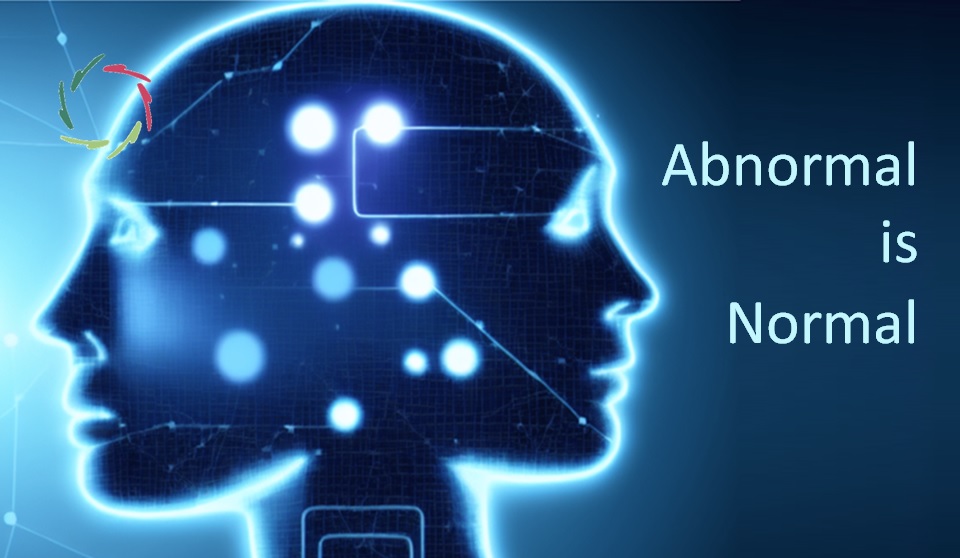Abnormal is Normal

For decades already, it has been suspected that mind-related ‘diseases’ are no genuine diseases. Each of them is the far end of a normal spectrum. In recent years, genetic research has made this clearer than ever.
This has huge implications for the diagnosis and therapy of almost all mind-related issues.
The genetic swing (*)
After the mapping of the complete human genome (some 3 billion elements) was declared complete in 2003, the search was on for those genes that could be identified as causing specific diseases. However, as to mind-related diseases, this came to little fruition.
That is, until a few years ago, when it was discovered that mostly not one or a few genes were responsible for any mental issue – whether or not in the pathological sphere – but rather many — that is, thousands, each contributing a bit and interactively.
This is called polygenic heredity and has several implications, especially in combination with the following insight.
The revenge of the genes
One implication is that it became clear that the role of genetics in the mental domain is far more significant than previously accepted, and generally more causal for ‘psychopathology’ than any other factor. Thus, the role – In the long term – of other factors (education, parenting, psychotherapy) is necessarily much smaller than thought.
This evidence comes on top of the reproducibility crisis in research, showing that substantially less is scientifically known than previously thought.
A boon for ‘anti-psychiatry.’
This was a controversial field within psychiatry based on the conviction that the medical model of cause-disease-diagnosis-therapy is essentially flawed to the detriment of many psychiatric patients.
They were right all along.
The diagnosis of such a ‘disease’ is always subjective and frequently culture-bound.
The Western take is more constructed than fundamentally true — as are also the takes from other cultures.
Of course, this is why Western science is so fabulous: it can prove itself to have been wrong. Thus, a beloved hypothesis can be dropped in favor of a better one ― even if it takes a generation sometimes.
In this case however, it shouldn’t take so long. There is too much suffering at stake, and the proof is too clear by now to be ignored any longer.
Let’s get enlightened — now.
Treating a disease is not possible if there is no disease.
Therefore, we cannot cure mental diseases. This, too, is an implication of the above and yet another boon for anti-psychiatry.
The idea of treating mental disorders must be replaced by the idea of supporting people who then help themselves to lead a more normal life if they wish so.
Note that they have never been ‘diseased.’ Their abnormal is just a more extreme form of their normal.
Normal distribution of traits
Almost all psychological traits have a normal (Gaussian, bell-shaped curve) distribution, with most people in the middle and a few in each of both tales.
There are generally no genes for psychological disorders. They are the same as those responsible for heritability throughout the normal distribution. The ‘diseased’ are those present at one tail of the spectrum. The distinction between abnormal and normal is artificial. There is no ‘them.’
What is interesting is also how those who are present at the other tail of the same spectrum can be characterized. Are they mostly seen as normal or are they otherwise problematic? Is this culture-dependent?
Lisa’s role
Being no medicine, Lisa doesn’t diagnose nor treat disease.
As shown above, this is also by far the most sensible thing to do since there is no disease to start with.
To her credit, Lisa supports people to help them lead better lives. This is also congruent with the above insights. Therefore, Lisa is by now the most scientifically validated way of handling the immense amount of mental suffering that we see worldwide. More generally, this is congruent with the overall AURELIS growth philosophy to which Lisa accords.
This doesn’t eradicate the need for empirical proof. In fact, it shows the urgent need to a huge degree.
We must go forward.
(*) For an in-depth introduction, see the excellent book of Robert Plomin: Blueprint: How DNA Makes Us Who We Are ― Mit Pr, 2018


